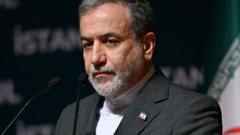As President Trump eases sanctions on Syria, the new government faces opportunities and challenges for reform and regional security.
# New Era for Syria: U.S. Lifts Sanctions and Sets Expectations for Future Governance

# New Era for Syria: U.S. Lifts Sanctions and Sets Expectations for Future Governance
A significant shift in U.S. relations with Syria follows the end of the civil conflict, promising economic recovery and stability.
In a surprising turn of events, President Trump has recently signed an executive order lifting most economic sanctions on Syria, signaling a new beginning for the war-torn nation. This executive action, which follows months of silence from the U.S. after the ousting of dictator Bashar al-Assad, represents a strategic shift aimed at revitalizing Syria’s faltering economy as over 90 percent of the population lives beneath the poverty line according to United Nations reports.
The announcement, made during Trump's visit to Saudi Arabia in May, was met with widespread enthusiasm within Syria, offering hope for a new chapter in the country's governance under President Ahmed al-Shara, the leader of the rebel forces that toppled Assad. While not all sanctions can be lifted without Congressional approval, the measure signals to global investors that Washington will not hinder economic engagements with the new regime, providing a much-needed lifeline.
Despite the optimism surrounding the easing of sanctions, U.S. officials have outlined expectations concerning the new government’s handling of regional dynamics, particularly as they relate to security issues and partnerships with neighboring countries. While Trump’s administration appears less concerned with the internal governance of Syria, it emphasizes the importance of certain policies, looking for commitment from al-Shara's administration to uphold pivotal regional cooperative efforts.
As Syria embarks on this journey towards recovery and stability, the international community will be watching closely how the country navigates its newfound autonomy and economic revival against the backdrop of past turmoil.
The announcement, made during Trump's visit to Saudi Arabia in May, was met with widespread enthusiasm within Syria, offering hope for a new chapter in the country's governance under President Ahmed al-Shara, the leader of the rebel forces that toppled Assad. While not all sanctions can be lifted without Congressional approval, the measure signals to global investors that Washington will not hinder economic engagements with the new regime, providing a much-needed lifeline.
Despite the optimism surrounding the easing of sanctions, U.S. officials have outlined expectations concerning the new government’s handling of regional dynamics, particularly as they relate to security issues and partnerships with neighboring countries. While Trump’s administration appears less concerned with the internal governance of Syria, it emphasizes the importance of certain policies, looking for commitment from al-Shara's administration to uphold pivotal regional cooperative efforts.
As Syria embarks on this journey towards recovery and stability, the international community will be watching closely how the country navigates its newfound autonomy and economic revival against the backdrop of past turmoil.




















